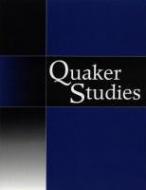
Abstract
Drawing on examples from the eighteenth and nineteenth centuries, it will be argued that the sciences - but particularly observational sciences such as astronomy, botany and meteorology - were highly acceptable to Quakers. Moreover, the study of nature was vested with an aesthetic that emphasised God as the Creator of nature and of order and beauty in the natural world. While many wealthy Quakers participated in these sciences, botany also provided employment for Quakers from less affiuent backgrounds. Hence a number Quakers made careers as botanical lecturers, writers, publishers and illustrators. The role of the botanical illustrator is explored to show that the aim was to portray nature- God's Creation- with integrity. This made botanical illustration, as opposed to most other forms of art, an acceptable activity.
Recommended Citation
Cantor, Geoffrey
(1999)
"Aesthetics in Science, as Practised by Quakers in the Eighteenth and Nineteenth Centuries,"
Quaker Studies: Vol. 4:
Iss.
1, Article 1.
Available at:
https://digitalcommons.georgefox.edu/quakerstudies/vol4/iss1/1
